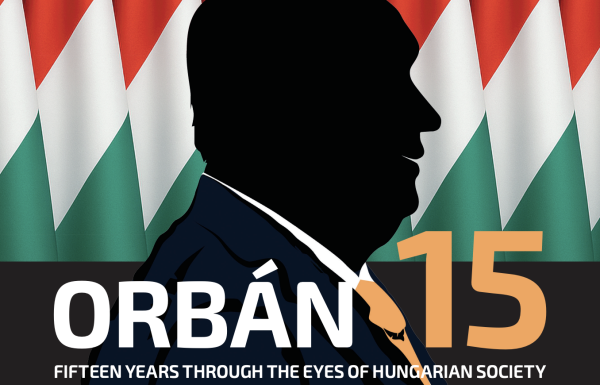
It has been 15 years since Fidesz won a landslide victory in the 2010 parliamentary election in Hungary, thereby capturing over two-thirds of the seats in the National Assembly. This gave the ruling party a constitutional supermajority. Looking back at the past 15 years, we can assert that there is no aspect of Hungarian politics, economy or social relations that has not been deeply affected by the measures taken by Prime Minister Viktor Orbán and the MPs of his party, who have been unfailing in doing his bidding.
The objective of our Policy Solutions survey was to ascertain how Hungarians view the Orbán government’s past 15 years. We hope that our study will contribute to a better understanding of voters’ opinions concerning the political, economic and social processes of the past decade and a half, and thereby also improve our grasp of the factors and policy measures that provide the basis for Fidesz’s ongoing support in society, while also laying bare the issues that the majority views critically. Based on the results of our survey, we draw conclusions not only regarding society’s view of Hungary’s state in general, but we also try to gauge which policy areas have seen improvements and which have deteriorated during this period; which of the government’s policy measures have been the most popular and which were most likely to be considered failures; and how citizens view their own chances at succeeding in today’s Hungary and what they think of the state of democracy in their country.
In addition to undertaking a comprehensive review of the past 15 years, we also reflect separately on numerous changes that have occurred in the 2020s, thus using this opportunity to juxtapose the current figures with the ones we collected five years ago, on the occasion of the tenth anniversary of the Orbán government. In the process of capturing the massive changes in domestic politics since 2024 and the shifts in the views of the public, we also sought to find out what voters think about individual policy areas: would Fidesz or the Tisza Party be better able to handle them?
"Orbán 15 - Fifteen years through the eyes of Hungarian society" can be downloaded from here.
Key findings:
- The most popular measures of the Orbán government since 2010: The 13th month pension, family subsidies, utility price controls, and anti-migration policies. Fidesz voters see the family support scheme as the Orbán government’s greatest success, while Tisza voters were most likely to pick the 13th month pension.
- The biggest failures of the past 15 years: health care, cost of living, and corruption. Fidesz voters were most likely to pick health care as the biggest problem of the past 15 years, while Tisza Party voters mentioned corruption.
- There is cross-party consensus in Hungary that the family support scheme, the 13th month pension, and the utility price controls need to be continued by the next government.
- A majority of Hungarians say that Viktor Orbán’s governance since 2010 has done more to hold the country back than to facilitate its growth.
- We examined how Hungarian society evaluates the Orbán government’s performance over the past 15 years in 23 key policy areas. There are two areas in which a relative majority of Hungarians have experienced an improvement: family support and sports. Moreover, there are six other areas (culture, public administration, public safety, job creation, opportunities for youth starting out in life, and the situation of the Roma minority) where, on the whole, respondents were more likely to see improvements or stagnation than deterioration.
- Dissatisfaction was especially high concerning health care, which was the most likely to be assessed negatively. Two-thirds of respondents (67%) perceived deterioration, while only 12% saw progress. The Hungarian public has a similarly unfavourable assessment of social inequalities (63% said that the gap between the rich and the poor has increased). A clear majority of Hungarian society further saw a deterioration in the degree of corruption (60%), in the state of Hungarian public education (59%), Hungary’s international standing (58%), the state of the economy (57%), opportunities for social mobility available to those in poverty (57%), the standard of living (57%), the functioning of democracy (54%), the situation of rural communities (52%), the assertion of Hungary’s national interests (52%), and press freedom (52%).
- There is massive polarisation on the issues of democracy, the economy, and the standard of living.
- Economic prospects: Fidesz has managed to improve the mood of its voters, even as opposition voters’ outlook on the future has soured further.
- The majority perceives that the Orbán government favours the rich, only cares about its own voters, and that to get ahead, one must be on good terms with the government.
- Hungary’s international position is worse than 15 years ago. Respondents were more likely to hold the Orbán government than the EU responsible for the freezing of EU funds.
- The Hungarian public considers Tisza to be more competent than Fidesz when it comes to managing a majority of public policy issues.
- In 2025, more respondents said it is possible to oust the Orbán government through a democratic vote than those who think this is impossible.
"Orbán 15 - Fifteen years through the eyes of Hungarian society" can be downloaded from here.
Authors: András Bíró-Nagy - Tamás Csontos - Kristóf Molnár - Attila Varga
The study was realised with the support of the Friedrich-Ebert-Stiftung Budapest.
Policy Solutions is a progressive political research institute based in Budapest. It was founded in 2008 and it is committed to the values of liberal democracy, solidarity, equal opportunity, sustainability and European integration. The focus of Policy Solutions’ work is on understanding political processes in Hungary and the European Union. Among the pre-eminent areas of our research are the investigation of how the quality of democracy evolves, the analysis of factors driving euroscepticism, populism and the far-right, and election research.
Follow us on Facebook!